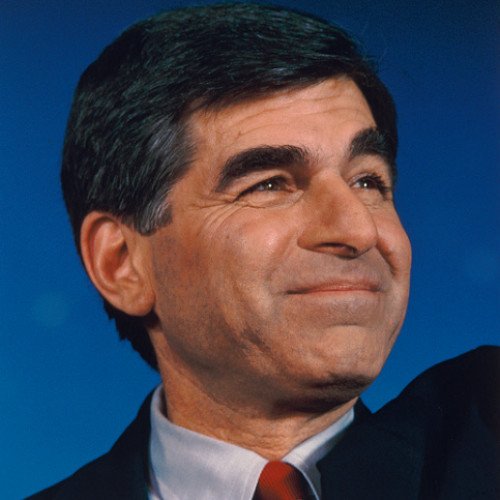Michael Dukakis VS Barry Goldwater

Michael Dukakis
Michael Stanley Dukakis (; born November 3, 1933) is a retired American politician and lawyer who served as the 65th governor of Massachusetts, from 1975 to 1979 and again from 1983 to 1991. He is the longest-serving governor in Massachusetts history and only the second Greek-American governor in U.S. history, after Spiro Agnew. He was nominated by the Democratic Party for president in the 1988 election, losing to the Republican nominee, Vice President George H. W. Bush. Born in Brookline, Massachusetts to Greek and Aromanian Greek immigrants, Dukakis attended Swarthmore College before enlisting in the United States Army. After graduating from Harvard Law School, he won election to the Massachusetts House of Representatives, serving from 1963 to 1971. He won the 1974 Massachusetts gubernatorial election but lost his 1978 bid for re-nomination to Edward J. King. He defeated King in the 1982 gubernatorial primary and served as governor from 1983 to 1991, presiding over a period of economic growth known as the "Massachusetts Miracle". Building on his popularity as governor, Dukakis sought the Democratic presidential nomination for the 1988 presidential election. He prevailed in the Democratic primaries and was formally nominated at the 1988 Democratic National Convention. Dukakis chose Senator Lloyd Bentsen of Texas as his running mate, while the Republicans nominated a ticket consisting of George H. W. Bush and Senator Dan Quayle. Dukakis lost the election, carrying only ten states and Washington, D.C., but he improved on the Democratic performances in the previous two elections. After the election, Dukakis announced that he would not seek another term as governor, and he left office in 1991. Since leaving office, Dukakis has served on the board of directors for Amtrak and has taught political science at Northeastern University and UCLA. He was mentioned as a potential appointee to the Senate in 2009 to fill the vacancy caused by Ted Kennedy's death, but Governor Deval Patrick chose Paul G. Kirk. In 2012, Dukakis backed the successful Senate campaign of Elizabeth Warren.
Statistics for this Xoptio

Barry Goldwater
Barry Morris Goldwater (January 2, 1909 – May 29, 1998) was an American politician, businessman, and author who was a five-term Senator from Arizona (1953–1965, 1969–1987) and the Republican Party nominee for president of the United States in 1964. Despite his loss of the 1964 presidential election in a landslide, Goldwater is the politician most often credited with having sparked the resurgence of the American conservative political movement in the 1960s. He also had a substantial impact on the libertarian movement.Goldwater rejected the legacy of the New Deal and, along with the conservative coalition, fought against the New Deal coalition. A member of the NAACP and active supporter of desegregation in Phoenix, Goldwater voted in favor of the Civil Rights Act of 1957 and the 24th Amendment to the U.S. Constitution, but opposed the Civil Rights Act of 1964, believing it to be an overreach by the federal government—a decision that considerably anguished him. In 1964, Goldwater mobilized a large conservative constituency to win the hard-fought Republican presidential primaries. Although raised as an Episcopalian, Goldwater was the first candidate of ethnically Jewish heritage to be nominated for President by a major American party (his father was Jewish). Goldwater's platform ultimately failed to gain the support of the electorate and he lost the 1964 presidential election to incumbent Democrat Lyndon B. Johnson by one of the largest margins in history. Goldwater returned to the Senate in 1969 and specialized in defense and foreign policy. As an elder statesman of the party, Goldwater successfully urged President Richard Nixon to resign in 1974 when evidence of a cover-up in the Watergate scandal became overwhelming and impeachment was imminent. Goldwater narrowly won re-election in 1980 for what would be his final and most influential term in the senate. In 1986, Goldwater oversaw passage of the Goldwater–Nichols Act, arguably his most significant legislative achievement, which strengthened civilian authority in the Department of Defense. The following year, he retired from the Senate and was succeeded by John McCain, who praised his predecessor as the man who "transformed the Republican Party from an Eastern elitist organization to the breeding ground for the election of Ronald Reagan". Goldwater strongly supported the 1980 presidential campaign of Reagan, who had become the standard-bearer of the conservative movement after his "A Time for Choosing" speech. Reagan reflected many of the principles of Goldwater's earlier run in his campaign. The Washington Post columnist George Will took note of this, writing: "We [...] who voted for him in 1964 believe he won, it just took 16 years to count the votes". Goldwater's views grew increasingly libertarian as he neared the end of his career. After leaving the Senate, Goldwater's views cemented as libertarian. He criticized the "moneymaking ventures by fellows like Pat Robertson and others [in the Republican Party] who are trying to... make a religious organization out of it." He lobbied for homosexuals to be able to serve openly in the military, opposed the Clinton administration's plan for health care reform, supported abortion rights, and the legalization of medicinal marijuana.